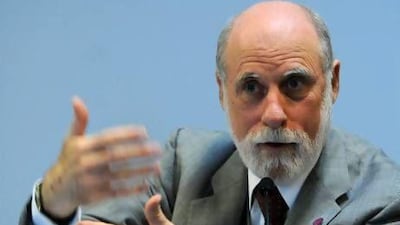DUBAI // The future of the internet could be radically altered by the outcome of a conference next week in Dubai, one of the founding fathers of the global information system has warned.
Vinton Cerf said the internet he helped invent 30 years ago could undergo drastic changes if proposed regulation is adopted at a meeting of governments beginning on Monday.
The World Conference on International Telecommunications will be attended by representatives of 196 countries and is organised by the International Telecommunications Union (ITU) - a United Nations body.
The conference will debate proposals put forward by member states, some of which, if adopted, could give government a greater hand in regulating the internet. "This is a very important moment in the history of the internet," Mr Cerf said. "This particular conference might introduce practices that will be inimical to the internet's continued growth and utility.
"Some of the proposals which have surfaced are quite alarming. They could have a potentially hazardous impact on the openness and freedom of the internet."
Among the proposals is a scheme whereby large companies would need to pay internet service providers (ISPs) in developing countries a "toll" for putting a large amount of traffic through their networks.
Mr Cerf, who is the "chief internet evangelist" at Google, said that the measure would stifle the growth of online businesses.
"It would affect anyone who was putting up a service on the internet, not just Google," he said. "If it were required that the party running a business to pay every ISP everywhere in the world, that would have a serious impact on third-world application development.
"The companies which are well established might not even be able to afford this. The thing I worry about is that it would be an inhibitor for any further development of new businesses on the internet."
Mr Cerf said that certain proposals, designed to target the spreading of child pornography by restricting anonymity, could be used by some governments to target political dissidents. "If any of these policies are adopted in the international treaty, they will be used by countries to pursue their own national agendas," he said.
Google has launched an online campaign for a "free and open internet", claiming that the ITU conference is a "closed-door meeting" that will give more restrictive governments an opportunity to regulate the internet.
Google is not alone. Organisations such as the hacker collective Anonymous have protested against the meeting, and the European Parliament has argued that the ITU is "not the appropriate body" to regulate the internet.
Mr Cerf, himself a former chairman of US internet name regulator, said that although private companies such as Google were part of country delegations at the conference, they didn't have an equal say to government representatives.
"All stakeholders should have a say about policy, especially when it comes to the internet," he said.
An ITU spokesman said the conference was arranged by member states to adapt a treaty from 1988 to the internet age. "The member states have decided themselves that the current treaty is unworkable and needs to be reviewed. We've collected proposals from them and they will be discussed at the conference.
"There are proposals which would look at revenue sharing in internet traffic, particularly in the case of over-the-top players. I think that what might be alarming some participants.
"However, for every proposal, there's usually another proposal which says exactly the opposite. It's a whole mix of stuff, and they will come to an agreement on what's important."
The spokeswoman said there wasn't any guarantee that a proposal from the draft would make it any further. "Anything that doesn't have overwhelming agreement will be dropped," she said.

